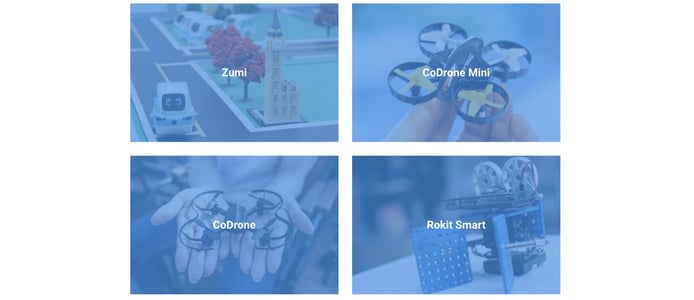
TL; DR: Robolink, founded in 2012, is on a mission to make STEM education fun and engaging. The San Diego-based company provides both robotics kits for students and resources for teaching the core principles of programming and engineering. Now, with the release of an affordable CoDrone Mini kit, Robolink aims to further increase accessibility to STEM education for the next generation of builders, inventors, and innovators.
Artificial intelligence (AI) is poised to transform the way we work, impacting nearly every industry as a driver of innovation.
Forrester Research predicts that by 2021, robotic automation technology will fulfill the roles of approximately 4.3 million humans. And, by 2022, one in five workers will rely on some form of AI to do their jobs.
But the fact that today’s K–12 students will enter an automation-saturated workforce doesn’t mean their schools are preparing them for that future. Few elementary and secondary schools currently teach the subject, largely due to the scarcity of AI curricula.
That’s where Robolink, an award-winning provider of STEM robotics kits and education, comes in.

Hansol Hong, CEO of Robolink, gave us an inside look at Robolink’s take on STEM education.
“We are focused on AI, because the technology will be changing a lot of people’s lives, but there are not a lot of educational tools or programs currently available in the K–12 market,” said Hansol Hong, CEO of Robolink. “We want to make sure that kids today will grow up learning — in a fun way — how to use and even develop AI technology.”
One of the company’s most recent robotics products, Zumi, is a miniature self-driving car that students can train to navigate an environment using AI. The kit includes step-by-step instructions and a full standards-aligned curriculum that focuses on what AI is, how it works, and how it can be applied in real-world scenarios.
And, with the release of the affordable and programmable CoDrone Mini kit, Robolink is making basic coding concepts even more accessible for future builders, inventors, and innovators worldwide.
Established in San Diego to Get Students Excited about STEM
Hansol, who grew up in Seoul, South Korea, founded San Diego-based Robolink in 2012 with a mission to help children and hobbyists learn to program robots and drones. Since then, the company has sold more than 80,000 kits worldwide and has helped educate over 10,000 youth in San Diego alone.
“Teaching students here in San Diego has helped us to improve our robot and drone kits based on feedback because we use them with students every day, from Monday through Sunday,” Hansol said. “That led to our expansion into schools across the nation.”
Hansol told us he’s always searching for ways to improve Robolink. In 2016, he was named one of Mashable’s top five robotics innovators at that year’s CES (an annual trade show organized by the Consumer Technology Association). “I’ve been trying to live up to that standard ever since,” he said.

Robolink offers a range of robotics and AI kits designed to prepare students for the technology of their futures.
But Hansol and Robolink are no strangers to recognition. In January 2019, the company’s robocar, Zumi, won the CES 2019 Best of Innovation Award. “We learned afterward that we were competing against the likes of massive companies, such as DJI, Intel, and BDI,” Hansol said. “That was a pretty big surprise for a small startup like us.”
In May 2020, The Wall Street Journal featured the Robolink Rokit Smart robot in a feature by Aaron Stern titled “The Best Robot Toys for Building Kids’ STEM Skills.” Most recently, the company was selected as a 2020 Cool Company by Connect, a San Diego-based nonprofit with a passion for helping build great tech companies.
Hansol told us he hopes the accolades and press coverage helps expand the company’s reach, which already includes working with teachers all over the world and shipping kits to nearly all continents.
Delivering Student-Focused Programming and AI Kits Worldwide
Robolink’s robotics kits currently include Rokit Smart, CoDrone, and Zumi.
Rokit Smart, Robolink’s original programmable robot kit, is perhaps the most versatile of the bunch. It allows students to learn code by building 11 unique robots using step-by-step tutorials. The kit features a real circuit board and is built with Arduino, a popular open-source programming environment.
CoDrone Pro is the first drone on the market designed specifically to teach Arduino-based programming. It is essentially the same as the CoDrone Lite but with a programmable remote, which students can use to create custom flight patterns or battle other CoDrones.
Zumi, on the other hand, is one of the first compact education kits focused on making AI approachable and accessible for nearly anyone using affordable open-source technologies.
It is designed to teach students self-driving car technology and ethics, deep learning, machine vision, basic robotics, and routing algorithms. Best yet, Zumi leverages industry standard tools, including Python, Keras, TensorFlow, and OpenCV, that are used by real self-driving engineers.
Robolink raised $150,000 in a Kickstarter campaign and sent out its first round of Zumi kits to backers. Customers can now order a soft-launch edition of Zumi on the Robolink site as well as instructional classes.
Virtual Learning Opportunities and Workshops
Approximately 70% of Robolink’s customers are superintendents, administrators, principals, technical specialists, and teachers who purchase the company’s technology for their schools. To best serve its customers, the company’s robotic kits and educational materials are designed with the educator in mind.
“Many times, the teachers who are leading coding or AI classes aren’t professionally trained in STEM — they’re sometimes biology or chemistry teachers,” Hansol said. “So one of the biggest challenges we have is making lesson plans and cheat sheets that allow anyone with any background to teach students this material.”
Of course, Robolink’s focus is also to delve deep into coding and AI concepts without overwhelming students.
“Our primary mission has always been to bring STEM education to K–12 students in very fun and interactive ways,” Hansol said. “We’ve been doing that mainly with coding, and now our push is to make AI easy and fun.”
Robolink’s virtual professional development courses are available in two- and four-hour blocks that can be personalized to cover a range of topics, including classroom management, guided programming with Scratch, and advanced programming with Python.
The company also offers its own classes and summer camps where beginners and advanced users alike can learn about coding and AI. These events were traditionally held in person but have moved online due to the coronavirus pandemic.
New: Learn Basic Coding with the Affordable CoDrone Mini
In addition to the CoDrone Lite and CoDrone Pro, Robolink recently introduced CoDrone Mini, a smaller and more affordable programmable drone.
“Educators always have to be concerned about their budgets, and since we launched the first version of CoDrone back in 2016, we’ve been learning a lot from the classroom experience,” Hansol said. “That’s why we’re now introducing an $89.99 programmable drone.”
CoDrone Mini features smaller propellers and thicker guards suitable for younger children and beginners. Students can fly the device using a remote via block coding using Blockly for CoDrone. Hansel said Robolink is excited about the opportunity to make programming with drones even more accessible and cost-friendly.
“There are very few programmable educational drones out there to begin with, but as far as I can tell, this is going to be the most affordable option,” he said.
HostingAdvice.com is a free online resource that offers valuable content and comparison services to users. To keep this resource 100% free, we receive compensation from many of the offers listed on the site. Along with key review factors, this compensation may impact how and where products appear across the site (including, for example, the order in which they appear). HostingAdvice.com does not include the entire universe of available offers. Editorial opinions expressed on the site are strictly our own and are not provided, endorsed, or approved by advertisers.
Our site is committed to publishing independent, accurate content guided by strict editorial guidelines. Before articles and reviews are published on our site, they undergo a thorough review process performed by a team of independent editors and subject-matter experts to ensure the content’s accuracy, timeliness, and impartiality. Our editorial team is separate and independent of our site’s advertisers, and the opinions they express on our site are their own. To read more about our team members and their editorial backgrounds, please visit our site’s About page.

